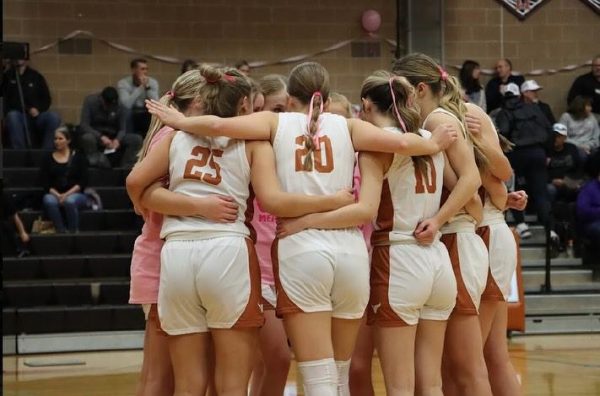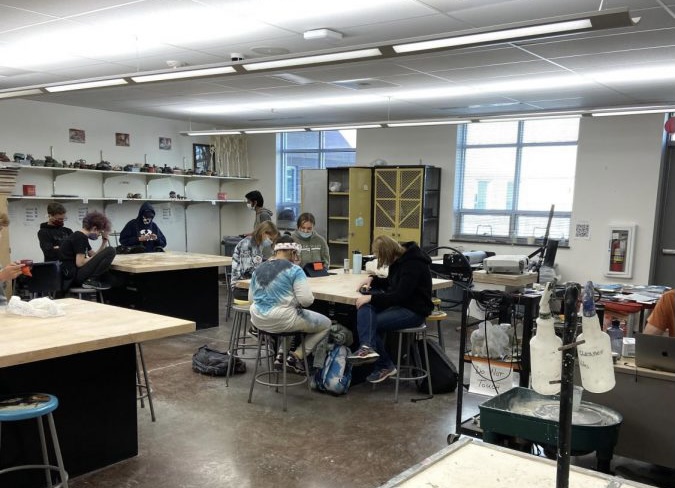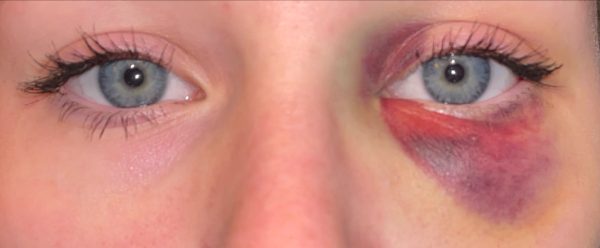Some students find Mav20 helpful, while others don’t see a purpose
Some are skeptical of the importance of the 20 minute advisory class implemented at MHS
Students in Mr. Schawel’s Mav20 class sit down after morning announcements.
Mav20 is a 20 minute advisory session for short lessons about everything from mental health to career exploration. Some of the student body has questioned whether Mav20 is truly necessary.
Mav20 can feel like a nuisance as students navigate busy halls to attend a short class. Some even said their teachers don’t always go through assigned lessons and the 20 minutes feels like a waste. The class serves to allow time for miscellaneous district requirements and provides a welcoming environment for students to socialize.
Mr. Garcia said that Mav20 has two goals: social and emotional wellbeing and academic graduation requirements. Socially and emotionally, Mav20 gives “students… a comfortable place to go everyday to unwind”.
He said, “[Mav20 teachers] get to know students, [which means students] at least have one adult they can get to know over the whole course of the time that they’re here.”
“The other goal would be to take care of a lot of academic graduation requirements like Naviance,” Mr. Garcia said.
Mr. Parsons said the purpose of Mav20 is “to provide some daily consistency for students,” and to “have a place where we can put all of the stuff that has to get done but doesn’t fit anywhere else”. He said that tasks such as handing out picture forms and yearbooks were previously fit into English classes, which took up valuable class time.
Ms. Meyer said that some teachers condense the Mav20 lessons for students, “I do every lesson, not always the way they’re written [because] sometimes I find them to be very cumbersome. They always have good material but I don’t think we need 20 minutes to do a lot of the things that we’re asked to do.”
Some students feel that lessons are repetitive and don’t help their mental health.
“Even though sometimes it can feel like [it’s not] helping,… the Sources of Strength stuff is important,” Mr. Parsons said.
He continued by explaining that having these lessons normalizes talking about mental health and safety even if students don’t feel an immediate shift after a Sources of Strength lesson.
Grace Kaplin (‘22) said lessons can benefit students who are planning on going to college. “It’s helpful to some kids [but other] kids don’t want to go [to college],” she said.
When asked her thoughts on the usefulness of the content taught in Mav20 lessons, Melanie Vazquez (‘22) commented, “Some of them I feel like they’re just doing it to fill time — it’s a good lesson but it’s not useful. They teach it correctly, but it doesn’t matter.”
Barrett Gill (‘23) said, “I don’t really learn anything new from [Mav20]. I do think [the lessons] are useful. I don’t even think I use my time there efficiently.”
It’s hard to determine if Mav20 has been effective, which might explain why it has been shortened and altered throughout the years. In previous formats, Mav20 was 30 minutes long every day or 60 minutes long every Friday.
Ms. Meyer said that the schedule changes came from needing “more passing period time and… more lunch time”.
Mr. Garcia said, “I think this is by far the best format we’ve had.”
Your donation will support the student journalists of Mead High School. Your contribution will allow us to purchase equipment and cover our annual website hosting costs.

Ana Sofia is a Senior at Mead. She enjoys watching films, spending time outdoors, and reading. She is looking forward to joining film club and NHS this year. Ana hopes to become a better writer and leader this year on The Mav.












Enola Potter • Dec 6, 2021 at 9:50 am
I love how you got different quotes from people!
Samantha • Dec 6, 2021 at 9:46 am
Mav20 is nice sometimes but overall I am skeptical as well.